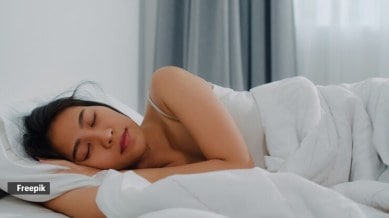📣 For more lifestyle news, click here to join our WhatsApp Channel and also follow us on Instagram
Try these expert-approved 8 hacks to fall asleep faster at night
Avoid heavy, spicy or acidic foods before bedtime for easier digestion, minimising disturbances during the night.

Falling back asleep can get difficult at times if you are jolted awake in the middle of the night. The more you panic over trying to get some shuteye, the farther away from sleep you feel you are. But fret not, Dr Yatin Sagvekar, Consultant, Neurology, Kokilaben Dhirubhai Ambani Hospital, Navi Mumbai, and Dr Sheetal Goyal, Consultant Neurologist, Wockhardt Hospitals, Mumbai Central, helped us with a quick guide with 8 hacks that promise to lull you into a deep slumber despite interruptions in the middle of the night.
1. Limit blue light
In the evening, exposure to bright or blue light from phones, TVs, or standard bulbs suppresses the production of sleep-inducing hormone melatonin. “The mere presence of darkness makes the brain release melatonin and, coupled with the cadence of the body’s movements, helps induce a deep sleep. Thus, the goal is to eliminate all light sources from your sleeping area,” said Dr Sagvekar.
monthly limit of free stories.
with an Express account.
2. Establish a consistent routine
“Consistency is king when it comes to sleep hygiene. Go to bed at the same time and wake up at the same time, no matter whether it’s a weekday or weekend,” he shared, adding that our brain thrives best in predictable conditions.
3. Nutritional support
According to him, consuming cherries or tart cherry juice in the evenings can help you fall asleep faster and sleep longer, as they are rich in melatonin. A good source of magnesium and tryptophan, almonds support relaxation. Adding bananas to your diet can also help improve sleep quality and reduce the risk of nighttime awakenings.
He recommended avoiding heavy, spicy or acidic foods before bedtime to facilitate easier digestion and minimise disturbances during the night.
4. Reduce EMF stress
Dr Sagvekar opined that proximity to a Wi-Fi router may disrupt sleep patterns due to electromagnetic fields, potentially interfering with the body’s circadian rhythm.
5. Master breathwork and meditation
Dr Goyal said meditating calms the mind by reducing anxiety, stress, and overthinking, lowering nervous activity and allowing the body to enter a calm state, which helps one sleep.
6. Balance salt and blood sugar
Lack of sleep disrupts the balance of hormones such as cortisol and growth hormone, which play a key role in glucose metabolism, she pointed out.
7. Warm feet, cool room
According to her, an ideal sleep environment is cool — around 18°C — which helps the body lower its core temperature, supporting melatonin release and natural sleep onset.
“Our feet contain specialised blood vessels that help regulate body temperature. Regulating the body’s core temperature, a process known as thermoregulation, is a natural signal that tells the brain it’s time to sleep,” she explained. Thus, wearing warm, fuzzy socks to bed can help maintain a comfortable temperature.
8. Calm your mind
Chronic emotional stress is the primary cause of elevated cortisol levels. Dr Goyal suggested managing it by incorporating some de-stressing activity into your day, such as breathwork, gentle movement, journalling, or anything that makes your soul happy.
DISCLAIMER: This article is based on information from the public domain and/or the experts we spoke to. Always consult your health practitioner before starting any routine.
📣 For more lifestyle news, click here to join our WhatsApp Channel and also follow us on Instagram